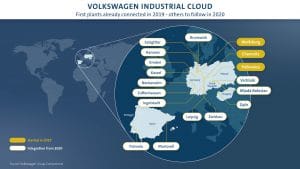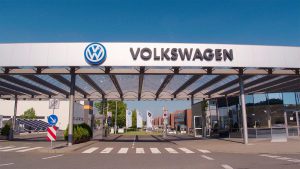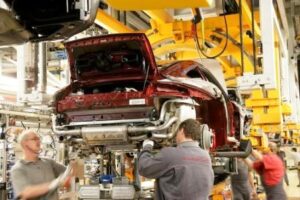
Volkswagen Group is forging ahead with the integration of its plants into the Volkswagen Industrial Cloud.
In a bid to trim costs, consolidate data collection and boost efficiency, the Volkswagen Group is developing its own cloud computing platform with help from Amazon that could save hundreds of millions.
The company initially launched its cloud server with Volkswagen Passenger Cars plants in Chemnitz, Wolfsburg and Polkowice, Poland.
“In 2020, we intend to bring 15 further plants into the Cloud,” said Gerd Walker, head of Production of the Volkswagen Group, who noted that work on the project continued during the shutdown of facilities due to the coronavirus pandemic, giving the company a good start on the project.
(Volkswagen preparing to restart its Chattanooga plant.)
“We are now forcing the pace and taking the Industrial Cloud to a large number of plants,” said Walker. This year, up to 15 further plants from the Audi, Seat, Skoda, Volkswagen Passenger Cars, Volkswagen Commercial Vehicles, Porsche and Components brands are to be connected, he noted.

Among the plants that will use the new cloud-based system is Zwickau, which produces VW’s first long-range EV, the ID.4
The program includes the plants at Brunswick, Emden, Hanover, Ingolstadt, Kassel, Leipzig, Neckarsulm, Salzgitter, Zuffenhausen and Zwickau in Germany as well as Martorell in Spain, Palmela in Portugal, Gyoer in Hungary and Mladá Boleslav and Vrchlabi in the Czech Republic.
“We’re delighted to see the rapid pace of development and expansion of the Industrial Cloud across more Volkswagen production facilities this year,” said Dirk Didascalou, VP of AWS IoT, Amazon Web Services.
“The functionality we jointly developed on top of AWS is providing a cost-effective and standardized way to collect and organize plant data into the Industrial Cloud and accelerate the delivery of use cases that further improve the efficiency of Volkswagen’s manufacturing and logistics processes,” he added.
In the first step, the group defined 15 different applications that are now being made available as standardized apps for all plants. The effort focuses primarily on the predictive maintenance of machines and the reduction of reworking on vehicles through artificial intelligence.
(Volkswagen shutting European factories for two weeks, wars of “very difficult year.”)
The implementation of the first 15 apps alone is expected to net cost savings of about €200 million, or $219.1 million, through the end of 2025.

VW Group’s Zuffenhausen plant in Germany is one of 15 that will use cloud computing to help improve efficiencies, saving millions.
In a “brownfield” approach, data from several hundred thousand machines and plant items will be recorded by sensors and analyzed by standardized apps on the Cloud. Each machine, equipment item and system will be connected manually. In the case of older systems, it will also be necessary to install sensors.
In the final stage of development, the total quantity of information to be processed each day will correspond to the volume of data from a small town in Germany.
“We have the know-how within the Group to derive efficiency potentials from this data and we are considerably expanding our expertise,” said Roy Sauer, head of Enterprise & Platform Architecture of the Volkswagen Group.
Currently, 220 experts within the group are working on the project and the number is due to rise to about 500 by the end of 2020. The solutions and applications currently being developed by Volkswagen are also to be made available to other companies within an open system. The development work on these applications will then continue together with the other companies.
(Volkswagen’s new software aims to eliminate crashes by 2050.)
Discussions with a number of other partners from various sectors have already reached a very advanced stage. Joint utilization and development offer considerable advantages for those participating because they will not need to develop the platform and services themselves and can benefit from synergies within the system, VW officials said.
